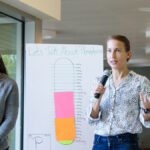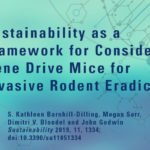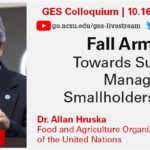
NSF News: Is our phosphorus use sustainable?
A U.S. National Science Foundation-supported study finds that most phosphorus stakeholders — representing a wide swath of industry, agriculture, environmental and policy interests — have significant doubts about the long-term sustainability of existing phosphorus management systems....Continue reading "NSF News: Is our phosphorus use sustainable?"

Dolphin Tank: Team-based innovation competition to win prizes!
Come join us for a team-based competition to develop pitches for biotechnology innovations that are socially responsible. Participants each receive a $30 Amazon gift card, Free Lunch & a chance to win a Wolfpack sweatshirt....Continue reading "Dolphin Tank: Team-based innovation competition to win prizes!"

Sustainability as a Framework for Considering Gene Drive Mice for Invasive Rodent Eradication
March 4, 2019 | Sustainability as a Framework for Considering Gene Drive Mice for Invasive Rodent Eradication, by S. Kathleen Barnhill-Dilling, Megan Serr, Dimitri V. Blondel and John Godwin. Abstract: Gene drives represent a dynamic and controversial set of technologies with applications that range from mosquito control to the conservation of biological diversity on islands. Currently, gene drives are being developed in mice that may one day serve as an important tool for reducing invasive rodent pests, a key threat to island biodiversity and economies. ...